Ahmad al-Sharaa, the de facto leader of Syria following the overthrow of Bashar al-Assad, announced that elections may take up to four years to organize due to the need for significant infrastructure preparation and the drafting of a new constitution. His group, HTS, is also expected to dissolve during a forthcoming National Dialogue Conference. Al-Sharaa seeks international legitimacy and has recently engaged in diplomatic talks with several countries, marking a notable shift in governance and foreign relations in Syria.
Syria’s de facto leader, Ahmad al-Sharaa, has indicated that elections in the country may take up to four years to organize. This marks the first detailed commentary on the electoral timeline since his rebel group, Hayat Tahrir Al-Sham (HTS), overthrew the Assad regime. Al-Sharaa emphasized the need for infrastructural preparation and the drafting of a new constitution, a process he estimates could take approximately three years. He stated, ‘We are now in the re-foundation of the country and not just managing the country.’ Furthermore, he revealed that HTS plans to be dissolved during the upcoming National Dialogue Conference, aimed at facilitating the transitional phase. Although a date for this conference has not been established, discussions with international delegations, including officials from Ukraine and various European nations, suggest a move towards greater recognition and legitimacy. Al-Sharaa also noted that Russia’s role in Syria should remain intact, reflecting on its military withdrawals since Assad’s removal. Additionally, he expressed a shift in approach toward regional dynamics, indicating that Saudi Arabia could play a significant role in Syria’s future, while urging Iran to reassess its regional interventions.
The current political climate in Syria follows the overthrow of Bashar al-Assad’s regime by the Islamist group HTS, illustrating a significant shift in power dynamics within the country. Ahmad al-Sharaa, previously known as Abu Mohammad al-Jolani, leads this group and is navigating the complexities of establishing a new government structure. As part of this transition, he is focused on rebuilding Syria’s governance infrastructure and drafting a new constitution to avoid repeating the mistakes of the past. The statements made by al-Sharaa highlight his intentions to gain international recognition and legitimacy, moving away from his previous affiliations while engaging with global and regional powers to help stabilize the country.
In conclusion, Ahmad al-Sharaa’s remarks on the electoral timeline and the forthcoming transitional processes in Syria underscore the complexity and the lengthy nature of establishing a new political framework in the country. His emphasis on reconstituting the state’s institutions and attracting international legitimacy marks a departure from previous governance under Assad. Ongoing diplomatic engagements and strategic relationships with regional players, especially Saudi Arabia, are pivotal for HTS as Syria navigates its transition towards a more stable and structured governance framework.
Original Source: www.cnn.com




